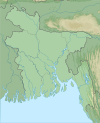Fasiakhali Wildlife Sanctuary
| Fasiakhali Wildlife Sanctuary | |
|---|---|
IUCN category IV (habitat/species management area) | |
 Fasiakhali Wildlife Sanctuary Location in Bangladesh | |
| Location | , Barisal Division, Bangladesh |
| Nearest city | Fasiakhali |
| Coordinates | 21°40′00″N 92°08′00″E / 21.66667°N 92.13333°ECoordinates: 21°40′00″N 92°08′00″E / 21.66667°N 92.13333°E |
| Area | 1,302 ha (3,220 acres) |
| Established | 2007 |
Fasiakhali Wildlife Sanctuary (Bengali: ফাসিয়াখালী বন্যপ্রানী সংরক্ষণ অভয়ারন্য) is a wildlife sanctuary in southern Chakaria Upazilla of Bangladesh. located on an island in Bay of bengal in the south of the country. The area of the sanctuary is 1,302 ha (3,220 acres),[1] and is located on eastern and northern hills of Bangladesh.
Climate[]
The rainfall is very high during the monsoon season,
History[]
Two forest villages of 112 inhabitants were set up in 1950. Later on a large population of Rohingya have settled inside the sanctuary.[1]
Management[]
The park is managed by one range officer and one forest beat guard. It is administered by the Coastal Forest Division at Bhola. It was declared as wildlife sanctuary on 2007 under the Bangladesh wildlife (Preservation) Amendment Act of 1947. No forestry activities is carried out in the mangrove forest except conservation activities. There are 16 villages inside the sanctuary with 33,00 population.
Biodiversity[]
The sanctuary has a tropical evergreen and semi-evergreen type of forest; the sanctuary is covered with dense shrubby vegetation with patches of dense forest and bamboos.
Flora[]
The vegetation is composed of forest of Gurjan (Dipterocarpus turbinatus) and Dhakijam Syzygium species. There are plantations of teak (Tectona grandis), Eucalyptus species and Acacia species.[2]
Fauna[]
The Indian elephant (Elephus maximus) is the major threatened species found in the sanctuary. The elephants are mainly restricted to the Dulahazara, Ringvong and Fasiakhal reserved forest blocks. The savannas and the perennial waterbodies inside the sanctuary support the population of elephants. The other threatened species are Clouded leopard (Neofelis nebulosa) and Hog badger (Arctonyx collaris) and along with Spotted deer (Axis axis) and Wild boar (Sus scrofa)[1]
Threats[]
The threats are encroachment for cultivation land, removal of forest produce and tree cutting by the local people .[1] The 5 kilometres (3.1 mi) long railway line proposed Chittagong- Cox's Bazar railway project will be passing through the buffer zone of the sanctuary .[3]
See also[]
References[]
- ^ a b c d Forest Department (March 2012). STATE OF PROTECTED AREAS OF BANGLADESH ’2012 (PDF). Dhaka: Forest Department. p. 27. Retrieved 7 December 2019.
- ^ Choudhary, Mukhtar Ahmed. "Fashiakhali wildlife sanctuary" (PDF). www.nishorgo.org. Retrieved 7 December 2019.
- ^ Environmental Assessment and Review Framework (PDF). Dhaka: Bangladesh Railways, Ministry of Railways. May 2016. p. 2. Retrieved 7 December 2019.
- IUCN Category IV
- Forests of Bangladesh
- Wildlife sanctuaries of Bangladesh

